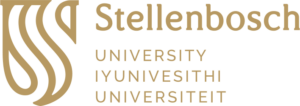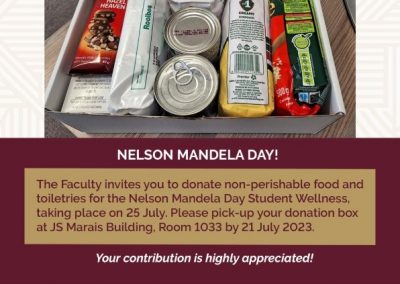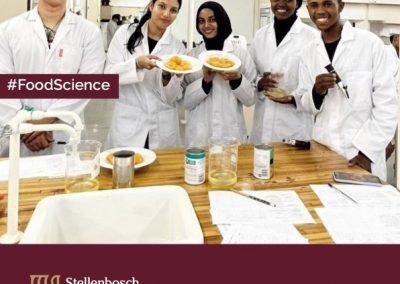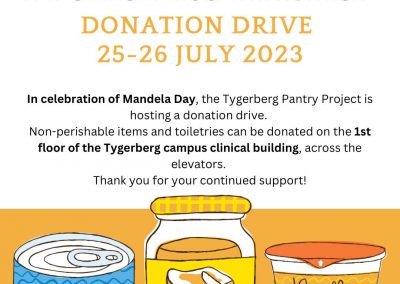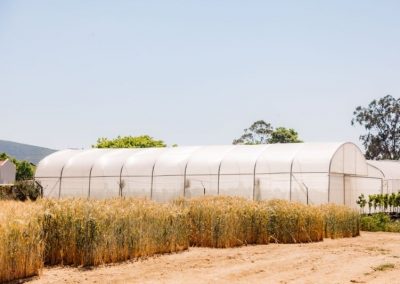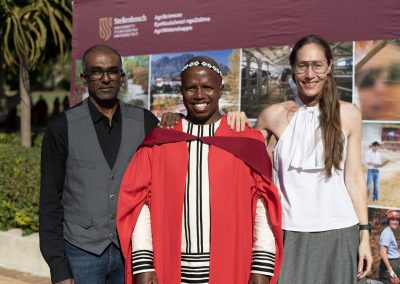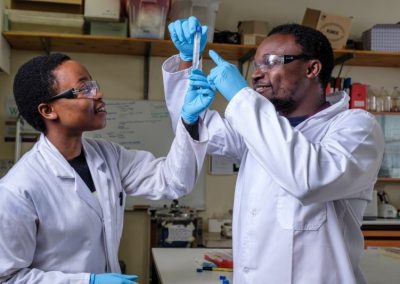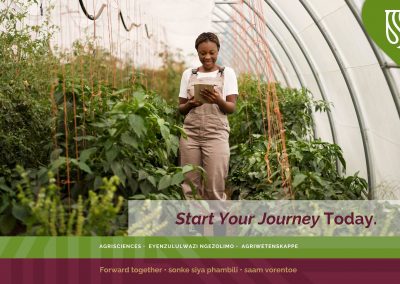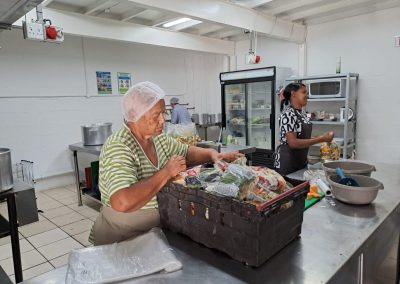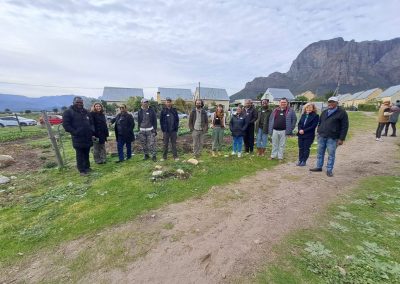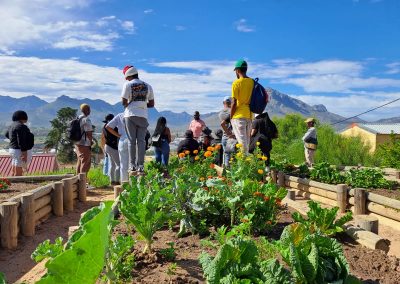Sustainable Development
at STELLENBOSCH UNIVERSITY
Sustainability contributions
SDG 2: Zero Hunger
SDG 2
Zero Hunger
Universities have the opportunity to improve the nutrition of local communities through intervention and education. The promotion of sustainable agriculture will ensure that food supplies are available for future generations, in an effort to reduce multi-generational poverty and hunger.
Food insecurity is a big roadblock to development. More than 25% of South Africans face moderate to severe food insecurity, while increased inflation rates have led to higher food costs. In addition to access to nutritious food, access to food remains despairingly high. Universities can improve the nutrition of local communities through intervention and education. To reduce multi-generational poverty and hunger, SU promotes sustainable agriculture, which will ensure that food supplies are available for future generations to mitigate food insecurity.
SDG 2 links with other SDGs through the reduction of hunger, including health and well-being (SDG 3), and strong institutions to combat hunger (SDG 16). Decent work and economic growth (SDG 8) can also reduce hunger by lifting people out of poverty. Zero hunger corresponds with the AU Goal 5: Modern agriculture for increased productivity and production.
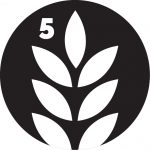
Goal 5
Modern agriculture for increased productivity and production
A range of social impact programmes at Stellenbosch University contribute towards Food Security. For more information, see the Division of Social Impact’s Platform for SDG 2.
Serving Nutritious Food while reducing food waste
SDG 2
Zero Hunger
Whether students reside in a formal campus residence or belong to a residential hub through the private student organisation, they are all able to access dining facilities that offer three wholesome meals per day with a balanced mix of protein, starches and vegetables for approximately R100 per day (2023). Those students who have atypical food needs and allergies can also be accommodated on request. The University’s dining halls allow for various dietary preferences, such as vegetarian and vegan meals, and kitchens are Halal certified. Food retailers in the Neelsie Student Centre on the Stellenbosch Campus and other commercial eateries also offer a wide variety of popular foods that include a range of healthy and sustainable food choices and accept payment from student accounts. The same holds true for the student residences, shops and cafes at SU’s Tygerberg and other campuses.
Stellenbosch University is also committed to ensuring that all students have access to healthy food. Reducing food waste on campus, especially through the dining halls on our various campuses, has been an ongoing project at SU for a number of years now. In 2023, over 742 325 online meal bookings were booked in residence dining halls, and 916 607 on-demand meals were purchased from call-order cafes.
The SU Waste Management Strategy addresses all waste on campus as holistically as possible to meet our goal of diverting 75% of waste from landfills. Food waste is monitored for the Stellenbosch, Tygerberg and Bellville campuses (Environmental Sustainability Report 2023: p 33). The Stellenbosch campus is the largest facility, accommodating almost 80% of staff and students, and produces the most waste by more than 60%.
| Stellenbosch Campus | Tygerberg Campus | Bellville Campus | Total | |
| Food Waste 2023 (kg) | 158 810 kg | 66 492 kg | 4 919 kg | 230 220 kg |
| Students | 26 618 | 4 493 | 1 752 | 32 863 |
| Staff | 2 419 | 1 013 | 55 | 3 487 |
| Campus Population | 29 037 | 5 506 | 1 807 | 36 350 |
In 2023, several initiatives were implemented to battle the organic waste generated through SU’s kitchens. Meals and portion sizes served in campus dining halls were carefully planned, by registered dieticians to ensure that healthy meals are offered to the SU community. Students can book These meals online to help the facilities gauge how much food they can prepare to avoid food waste. Food waste from residences and student centre kitchens is mixed with bokashi materials for anaerobic composting, stored at a facility on campus and batch transported to Nun Waste for composting or vermiculture.
Accessible, healthy meals
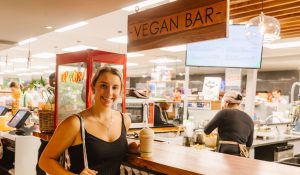
Whether students reside in a formal campus residence or belong to a residential hub through the private student organisation, they are all able to access dining facilities that offer three wholesome meals per day with a balanced mix of protein, starches and vegetables for approximately R100 per day (2023). Those students who have atypical food needs and allergies can also be accommodated on request. The University’s dining halls allow for various dietary preferences, such as vegetarian and vegan meals, and kitchens are Halal certified. Food retailers in the Neelsie Student Centre on the Stellenbosch Campus and other commercial eateries also offer a wide variety of popular foods that include a range of healthy and sustainable food choices and accept payment from student accounts.
The carbon footprint of our meals
Global food systems are responsible for 25 – 30 per cent of the global greenhouse emissions. As part of our purchasing agreements, the kitchens at our residences must make local and sustainable food purchases, where possible, benefitting Small and Medium Enterprises. Additionally, in 2023, the university purchased the Klimato system, which is a collection of emissions factors that are used to assess the climate impact of the food procured by food businesses. Making SU the first institution in Africa to do so. This program is being adapted to South African food production systems. Through this initiative, the University better understands where the biggest carbon costs are and manages their impact on the environment by optimising SU’s purchasing and creating a more sustainable value chain.
Food security and availability
SDG 2
Zero Hunger
Stellenbosch University aims to ensure that no student is burdened with food insecurity, especially while pursuing their studies. SU offers students a food allowance to combat food insecurity through our food security and emergency relief initiative. An anonymous self-service portal is available for students to access wellness resources aimed at helping alleviate financial strains and food insecurity to achieve academic success.
Raising funds and combating food insecurity
The Bridge the Gap fund provides funds for several SU initiatives every year, including the #Move4Food campaign and the Tygerberg Pantry Project. The #Move4Food drive has raised more than R1.4 million since 2018 to support Stellenbosch students facing food shortages, while the Giving Day programme collects food from staff for student pantries in an inter-faculty challenge. These programmes complement the Food Security initiative. Additionally, the kitchens are able to donate some vouchers that our social workers can give to needy students to redeem at the dining halls. Students who receive these vouchers can book their meals as per the normal system, not differentiating them from the other students to indicate they receive food aid.
In addition to the more formal programmes like #Move4Food and Giving Day, staff also contribute to the more informal collections for students who suffer from food insecurity. In 2023, this was galvanised by the Mandela Day theme “Climate, Food, Solidarity” to emphasise the need for sustainable food environments on campus and the vital connection between staff and student wellbeing and active citizenship. Staff, departments, and faculties were encouraged to put together a trolley of essentials that could be used to assist needy students on campus. Staff members in need are able to access help and counselling through SU’s wellbeing portal for individuals.
Public-access events, Resources and Community Interaction
SDG 2
Zero Hunger
The Faculty of AgriSciences at SU has a range of projects dedicated to supporting Stellenbosch, South African and African Agricultural sector. It focuses on offering programmes to contribute to supporting land ecosystems, through programmes in service of agriculture and forestry for the sustainable use of the region’s natural, physical and social resources. This enables participants to apply relevant scientific knowledge across the production chain to deliver diverse products that are economically viable, environmentally responsible, and sustainable through strong resource management principles.
Southern Africa Food Lab
As a faculty dedicated to understanding sustainable food production and solutions, the Faculty of AgriSciences offers a range of projects which aim to improve food security in South Africa and Africa. Notably, the African Food Systems Dialogue Series, led by SU’s Southern Africa Food Lab, tackles critical challenges in African food systems, including hunger, malnutrition, and resource inequality. This initiative gathers leading food policy experts, researchers, policymakers, community leaders and students for public lectures and discussions aimed at fostering knowledge exchange and collaborative problem-solving. In 2023 alone, the Southern Africa Food Lab, which is funded by SU and is housed under the umbrella of the Food Security Initiative at the University, presented three public lectures on the theme of “African Food Systems”, which is aimed at spreading knowledge about factors affecting farming and food production in Southern Africa. The series strives to move beyond dialogue to foster new relationships and understanding that might drive concrete actions like research projects and policy recommendations to contribute toward a more sustainable and equitable African food system. In contributing to a process of learning and knowledge creation, the Food Dialogues focus on helping define the challenges affecting African food systems and generate knowledge to solve them. Programmes such as these allow for the exchange of best practices, innovations, and knowledge of sustainable food systems. This allows for the application of scientific knowledge across the production chain to produce products that are economically viable, environmentally responsible, and sustainable through strong resource management principles.
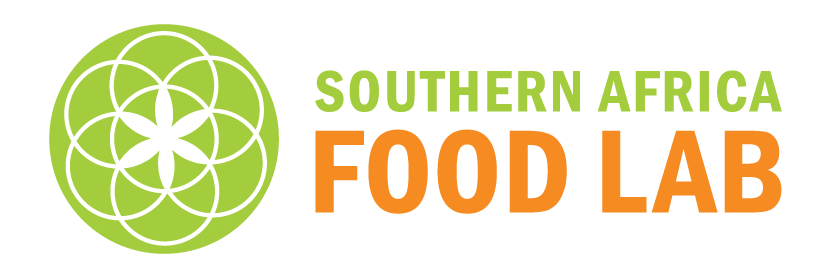
Education for Sustainable Agricultural systems
Agriculture remains the backbone of many African economies. Africa has the youngest population of any continent but also has a significant poverty rate, which increases the reliance on agriculture to sustain livelihoods. Farmers often rely on traditional farming practices to meet their agricultural needs. However, these methods cannot withstand unpredictable climate events, soil degradation, and resource scarcity. Modern agriculture offers sustainable solutions to traditional practices. By modernising agriculture in Africa, we can achieve increased productivity, create more resilient, diverse economies and expand job creation in the agricultural sector.
Educating the agriculturalists of the future
SU’s Faculty of AgriSciences produces degree-holding graduates who directly contribute to sustainable food production. The faculty is held in high regard both locally and internationally for the quality of its research and teaching outputs and has approximately 1000 undergraduate and 700 postgraduate students. Of the 8891 graduates SU delivered in 2023, 511 were in the AgriSciences in fields such as Aquaculture and Aquaponics, Conservation Ecology and Entomology, Agricultural Economics, Agronomy, Animal Science, Forest and Wood Science, Horticultural Science, Soil Science, Viticulture and Oenology, Food and Nutrition Security, and Sustainable Agriculture. The faculty also offers two Interdisciplinary Masters: The Masters in Food and Nutrition is offered in collaboration with the Faculty of Medical and Health Sciences, and the Masters in Sustainable Agriculture is obtainable within various departments within AgriSciences.
Short-form Agriculture Training
Stellenbosch University provides access to food security knowledge with the aim of improving food security in South Africa and beyond. Agri-Training provides free learning modules for Fall Army Worm mitigation as well as accredited short courses on a range of subjects through our Short Courses division on Broad Acre Crop spraying, Vegetable Spraying, Summer Grain Crop Cultivation, and more.
Knowledge transfer and training for local farming communities
SDG 2
Zero Hunger
In an effort to assist our local agricultural community we offer the following services to industry and other Higher Education institutions in South Africa and the rest of the continent.
The Hortidemo Centre
The HortiDemoCentre, a 3 000 m2 multi-span greenhouse, funded by the Dutch Government has been housed at the Faculty of AgriSciences since 2022, at the Welgevallen Experimental Farm. The programme offers training on advanced Dutch horticultural technology in which climate smart farming helps to produce better and healthier products throughout the year while using less water and less pesticides for more sustainable food production. The Centre and Greenhouse offers resources and training to students, established and up-and-coming farmers, agronomists, researchers, local government officials and extension specialists, as well as value chain participants like buyers and retailers.
The centre not only serves the well-developed Agricultural Sector, but also aims to develop the under-resourced emerging and subsistence sector that struggles to reach high quality and premium prices. This centre not only contributes to SDG 2 and Zero Hunger, but also aims to contribute to Good Health and Well-being (SDG 3), Quality Education through capacity building and knowledge transfer (SDG 4), Decent work and Economic Growth (SDG 8) by promoting economic growth in the local communities, Sustainable cities (SDG 11) by stimulating local growth, and lastly Partnerships for the Goals (SDG 17) by establishing partnerships for between the private and public sector.
DIVAGRI
The DIVAGRI (Revenue Diversification in Africa through Bio-based and Circular Agricultural Innovations) aims to enhance agricultural productivity, sustainability, and livelihoods by introducing innovative, circular bio-economy solutions to rural African farming communities. The consortium is active in South Africa, Namibia, Ghana, Mozambique, and Botswana and was made possible by EU Horizon 2020 funding. The SU Water Institute is one of the leading partners in the project. The SU Water Institute has rolled out a number of projects at the Welgevallen Experimental Farm and the pilot site includes a solar desalination greenhouse, a bio-char kiln, innovative irrigation systems and bio-based technologies for testing in the field. This project will not only upscale bio-based technologies in these countries, leading to increased agricultural production, but also improve the socio-economic outcome of the communities through sustainable livelihoods and resilient communities.
Strengthening communities further
The Southern Africa Food Lab has also been running the Strengthening Local Food networks for food systems transformation project since 2020. This project aims to educate small-scale farmers in the eThekwini and iLembe District Municipalities in KwaZulu Natal Province about food safety standards. They hope to help reduce malnutrition and disease due to unsafe food handling practices in these communities.
Services to industry
- The Central Analytical Facility (CAF) is made up of a number of laboratories across the university and is especially important for their soil and water testing. Through the laboratory network, we offer water, soil, microbial, and chemical analyses.
- The Plant Disease Clinic within the Faculty of AgriSciences offers testing and consulting services, with a specialisation in plant pathology and the diagnosis of fungal or bacterial diseases on various crops. The Department of Conservation Ecology and Entomology also offers virus diseases and insect identifications.
- New product development – including research and development, feasibility studies, market research, business plans, surveys, and sensory-tasting panels.
- Various departments offer consultation services to industries, including extension and outreach, studies and reporting, feed formulation and financial models.
Stellenbosch Civil Advocacy Network
SDG 2
Zero Hunger
The Stellenbosch Civil Advocacy Network (SCAN) is a collaborative network uniting civil society, local government, businesses, and Stellenbosch University to promote socio-economic development in Stellenbosch. SCAN focuses on fostering cooperation across sectors to advance socio-economic goals through advocacy, networking, and information sharing. It acts as a representative umbrella body for diverse civil society networks, supporting collaboration for shared value and accountability within the greater Stellenbosch Municipal area.
A core initiative within SCAN is the Food Systems Working Group (FSWG), which promotes sustainable food practices in Stellenbosch. With participation from NGOs and Stellenbosch University, the FSWG strengthens local food resilience through learning, capacity-building, and knowledge exchange (see partners). Responding to food system vulnerabilities exposed by the COVID-19 pandemic, FSWG mapped and analysed food relief efforts, highlighting the importance of interconnected systems for food security.
Notably, the FSWG partners with the Living Soils Community Learning Farm in Lynedoch. Supported by the Woolworths Trust, Spier Wine Farm, and the Sustainability Institute, this regenerative farming project teaches sustainable agricultural skills to young farmers, addressing issues like food insecurity, climate change, and unemployment.
Contributing to the Community of Practice
As an active knowledge partner, Stellenbosch University has held several workshops with SCAN, and additionally published accompanying practical guides to growing your own food in a sustainable and effective way.
- Aquaponics systems can help to mitigate the impact of climate change in African and advance Food Security (PDF)
- Build your own Aquaponics System at home (PDF)
- How to grow herbs and vegetables more efficiently (PDF)
- It is possible to grow your own food with limited resources (PDF)
- Low-technology innovations in urban agriculture (PDF)
- The organic vegetable garden in urban areas (PDF)
Sustainable Food Purchases
The University advocates in its Environmental Sustainability Plan (theme 5) to purchase goods and services from companies and organisations where Chain-of-Custody credentials are available and evaluated. Through this, SU hopes to raise awareness of environmental sustainability among these companies and organisations through collaboration and education. In line with this, when advertising tenders to appoint external companies to the University to operate the commercial kitchens, the tender requires service providers to prove to the tender committee that they will preferentially select products from local small, medium and micro-enterprises and other guidelines as per the SU Sustainable Procurement Plan.
